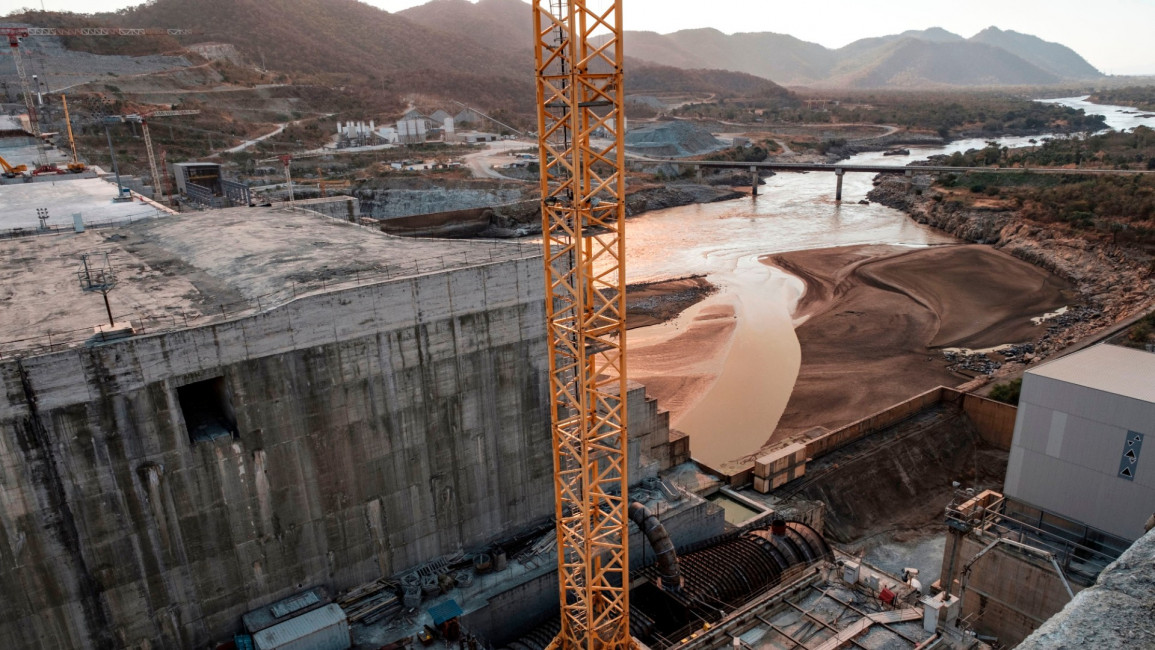Follow us on Facebook, Twitter and Instagram to stay connected
Ethiopia, Egypt and Sudan resume Renaissance Dam talks following deadlock
Ethiopia, Egypt and Sudan resume Renaissance Dam talks following deadlock
The trio of African Union countries appear to have come together to discuss the controversial dam.
3 min read
Talks have resumed on the controversial dam project [Getty]
The three major powers involved in negotiations over Ethiopia's construction of the Grand Renaissance Dam (GERD) reservoir in the Blue Nile have agreed to resume talks, as Addis Ababa reveals that its first-year target has been reached for filling the mega-dam.
Leaders of Ethiopia, Egypt and Sudan announced the resumption of talks following a deadlock due to tensions over its construction, during a virtual meeting between Ethiopian leader Abiy Ahmed, Sudan’s Abdalla Hamdok and Abdel Fattah al-Sisi’s administration.
"The extraordinary meeting... concluded with all parties reaching a major common understanding which paves the way for a breakthrough agreement," Abiy's office said on Twitter.
South Africa’s President Cyril Ramaphosa chaired the online meeting of the African Union, and posted on Twitter: "The trilateral negotiations remain on track."
"It was agreed, at the conclusion of the summit, to continue negotiations and focus for the time being on giving priority to developing a binding legal agreement on the rules for filling and operating the Renaissance Dam," a statement issued by the Egyptian presidency said.
This comes as Ethiopian Prime Minister Abiy Ahmed's office revealed there was enough water to test the dam's first two turbines.
"It has become evident over the past two weeks in the rainy season that the GERD first year filling is achieved and the dam under construction is already overtopping," Abiy's office said in a statement, using the acronym for the Grand Ethiopian Renaissance Dam.
|
Last week, the Sudanese ministry of irrigation and resources revealed a decrease in the level of water coming from Ethiopia at a rate of 900 million cubic metres.
It claimed this was due to Ethiopia filling the Great Renaissance Dam, which was later denied by Addis Ababa.
Tensions remain high
Political tensions have been running high between upstream Ethiopia and downstream Egypt and Sudan after recent ministerial talks failed to produce a deal on the filling and operation of the dam.
Cairo fears the dam would severely cut its Nile water supply, which provides nearly 97 percent of the country's freshwater needs.
Last Tuesday, emergency talks to avert a crisis failed to bear fruit and Ethiopia went ahead with filling the dam the following day.
Egypt said last month at the UN that the dam represents an "existential threat" for the country, endangering its water supply downstream.
Khartoum hopes the dam will help regulate flooding, but in June it warned that millions of lives will be at "great risk" if Ethiopia unilaterally fills the dam.
In a letter to the United Nations Security Council, Sudan raised concerns that water discharged from the GERD could "compromise the safety" of its own Roseires Dam by overwhelming it and causing flooding.



